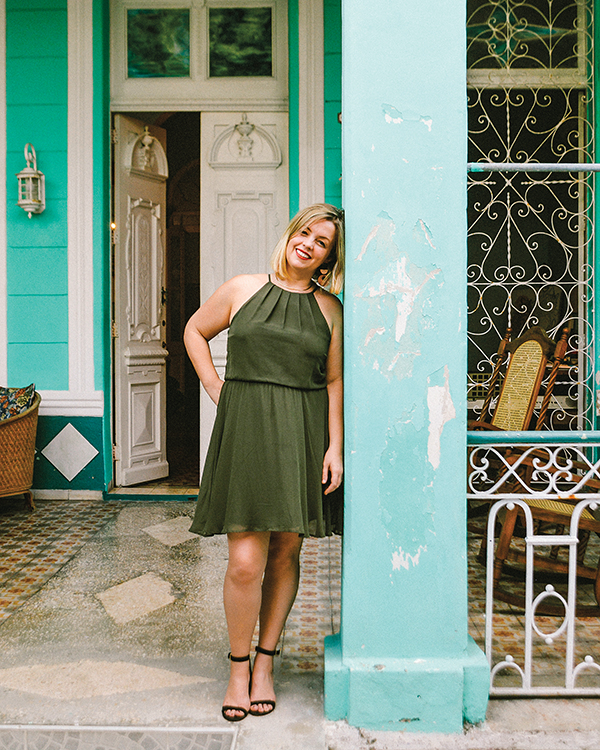
Take a seat next to Kay Whitchurch ’02 at a rooftop restaurant specializing in garlicky grilled octopus, fried plantains, ceviche, and rice and beans. Follow her through an unmarked door into an artist’s studio full of contemporary paintings. Allow a dance partner to lead you through the rhythm of salsa. And hop into a cherry-red classic car to see historic buildings. This is a glimpse of the immersive experiences that Whitchurch arranges in Havana, Cuba, through her travel company Otros Ojos — “other eyes” in Spanish.
“Otros Ojos is the philosophy of shifting your perspective and opening yourself up to creative views and different ways of seeing the world,” Whitchurch explains. Her husband and business partner, Norberto Guerra, came up with the name.
They met when she first visited Havana in 2015. At the time, Whitchurch was a graduate student earning her MFA in painting at California College of the Arts. She’d been all over the world, from Myanmar to Lebanon, firmly believing that travel inspires her creative practice. Although Whitchurch “didn’t speak a lick of Spanish,” she decided to travel to Cuba during break, just after President Obama announced that relations between the two countries would begin to thaw.
“I didn’t really know anything about Cuba, but I was deeply curious about the transitions it would be undergoing,” she recalls. On the fourth night of her trip, Whitchurch was in search of live music when she entered one of Havana’s oldest restaurants. There she met Guerra, the music coordinator who was playing with his band. The two went out for drinks afterward, instantly connected, and became engaged two months later. “Everyone thought we were crazy,” she recalls.
Although it would take time for them to determine the direction of their business, they “knew very early on that not only were we going to be together, but also that we wanted to be a part of life in Cuba, connect to the creative world there, and share it [with others],” Whitchurch says.
They traveled back and forth between Cuba and Chicago, where she’s from, building a life in both locations. The idea for the travel company sprung from hosting a Chicago supper club — get-togethers where hosts allow people to make dinner reservations at their homes. The concept is popular in both Chicago and Cuba, where they’re called paladars.
“Norberto’s a great cook, on top of being a world-class musician,” Whitchurch says. So they prepared a Cuban feast, mixed mojitos, and played Latin music. “We had this beautiful experience of bringing together people who didn’t know each other,” she remembers. “I realized that it was the authentic, nimble experience that we could curate in Cuba for travelers.”
It’s been nearly two years since that first dinner party, and the couple now leads numerous trips a year, from art and music excursions to creative retreats. Their 100-year-old “Turquoise House” serves as the central meeting point, where the group gathers in the evenings to chat, listen to old Cuban jazz records, and pass around a bottle of rum. Guests then lodge at casa particulares (B&Bs) in the couple’s Vedado neighborhood.
Havana — the cultural center of Cuba — is one of the safest places in the world, according to Whitchurch. Still, it helps to have a guide with insider knowledge because travelers can’t expect to rely on modern conveniences like credit cards and mobile phones. In addition, Cuba runs on its own time, so information about music shows and other events spreads through word of mouth. “While we have an itinerary, the cultural calendar shifts all the time,” she says.
Flexibility is key, in general, for the experience Otros Ojos provides. “This is catered to somebody who is a traveler at heart and wants a lot of context and community, but also wants to explore,” she says. “It’s my obsession to make them feel agile, not like they’re following a tour guide.”
Their overall goal is to use art, music, and food as tools for understanding the complexity of the city and the country.
“The Cuban experience is full-spectrum living,” Whitchurch says. “The joy you will feel and the presence of people is so much more vibrant. If you’re traveling there in the right way, you’re stretching the emotional range.”
